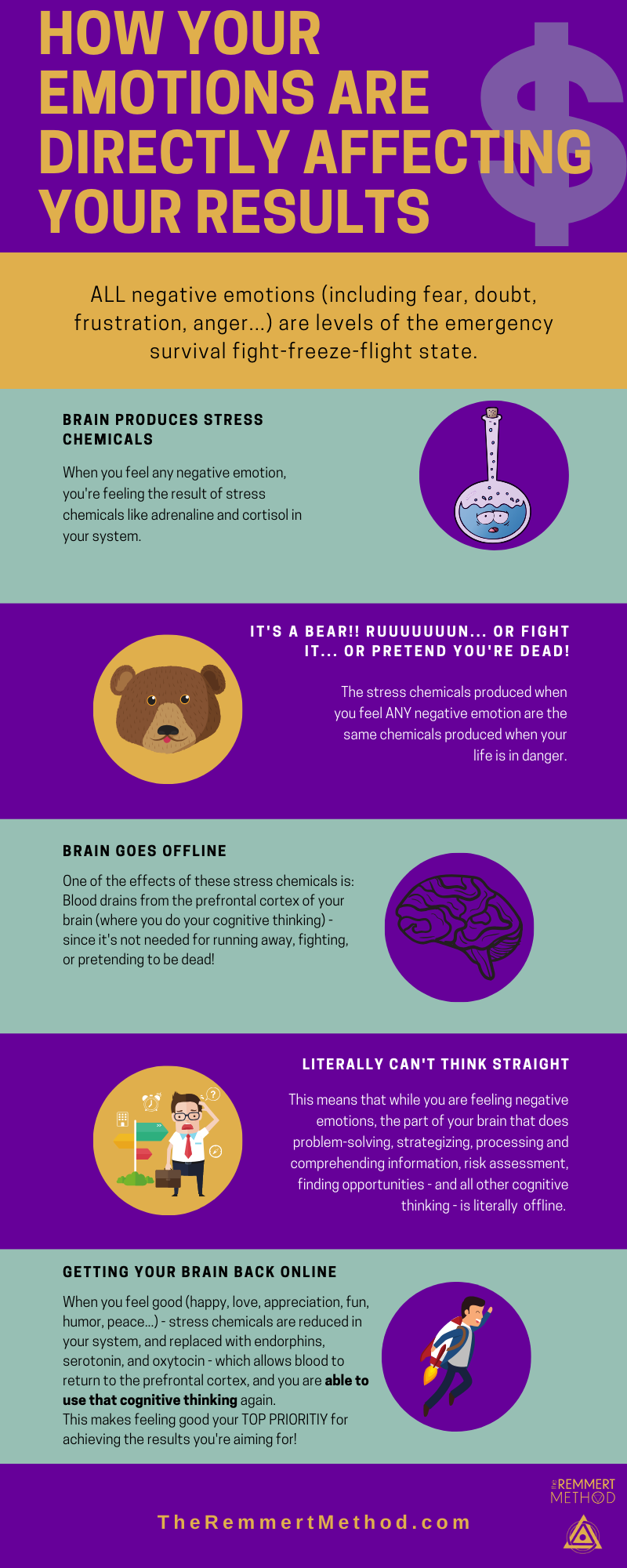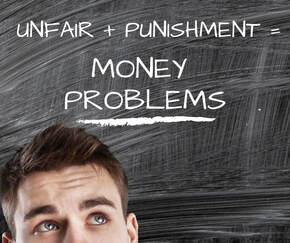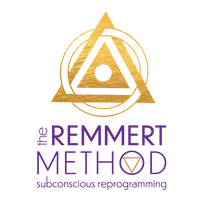Articles that will help you to gain a deeper understanding and empower you to stay on track to get the results you're aiming for.
How Your Emotions are DIRECTLY Affecting Your Results

Here’s the physilogical connection between your emotions and your results in all areas of your life…
Feeling good is about more than just feeling good, it has a direct impact on the results you experience in your life — including finances, business, career, relationships, and all other areas.
When you feel an emotion, what you’re feeling is the sensation — the physical sensation — of chemicals in your system.
All negative emotions are the result of some level of stress chemicals, like adrenaline and cortisol, in your system.
Positive emotions are the result of “feel-good chemicals” like endorphins, serotonin, and oxytocin, in your system.
When you feel: sad, angry, scared, worried, lonely, hurt, betrayed, frustrated, anxious, hopeless — or any other negative emotion — your brain and body are producing the same chemicals they would if your life was in danger.
It’s a BEAR! No Thinking Allowed!
In other words, when you feel bad, emotionally, your body is in the same emergency fight-freeze-flight state it would be in if you were faced with a bear.
One of the effects of these stress chemicals is:
Blood drains from the prefrontal cortex of your brain — where you do your cognitive thinking — to the back of the brain, (amygdala and other parts of the brain responsible for survival responses).
Reference: Stress signalling pathways that impair prefrontal cortex structure and function
Cognitive thinking like: problem-solving, strategizing, processing and comprehending information, noticing and assessing opportunities, effective communication… and all other higher-level thinking — is not only unnecessary for escaping a bear, it would be detrimental. While you’re strategizing… the bear is already attacking.
So, blood is directed to the parts of the brain that are responsible for running away, fighting, or pretending to be dead...
Continue Reading Full Article: How Your Emotions are Directly Affecting Your Results in All Areas of Life
Feeling good is about more than just feeling good, it has a direct impact on the results you experience in your life — including finances, business, career, relationships, and all other areas.
When you feel an emotion, what you’re feeling is the sensation — the physical sensation — of chemicals in your system.
All negative emotions are the result of some level of stress chemicals, like adrenaline and cortisol, in your system.
Positive emotions are the result of “feel-good chemicals” like endorphins, serotonin, and oxytocin, in your system.
When you feel: sad, angry, scared, worried, lonely, hurt, betrayed, frustrated, anxious, hopeless — or any other negative emotion — your brain and body are producing the same chemicals they would if your life was in danger.
It’s a BEAR! No Thinking Allowed!
In other words, when you feel bad, emotionally, your body is in the same emergency fight-freeze-flight state it would be in if you were faced with a bear.
One of the effects of these stress chemicals is:
Blood drains from the prefrontal cortex of your brain — where you do your cognitive thinking — to the back of the brain, (amygdala and other parts of the brain responsible for survival responses).
Reference: Stress signalling pathways that impair prefrontal cortex structure and function
Cognitive thinking like: problem-solving, strategizing, processing and comprehending information, noticing and assessing opportunities, effective communication… and all other higher-level thinking — is not only unnecessary for escaping a bear, it would be detrimental. While you’re strategizing… the bear is already attacking.
So, blood is directed to the parts of the brain that are responsible for running away, fighting, or pretending to be dead...
Continue Reading Full Article: How Your Emotions are Directly Affecting Your Results in All Areas of Life

Can We Change Adverse Childhood Memories?
The ACE study highlighted the problem. Now What?
The data gathered from the ACE study has provided a powerful insight into the connection between childhood adverse experiences and challenges in adulthood. This has led to a focus on child protection services, awareness in schools, and a drive to help parents to provide a safer, calmer, more secure and nurturing environment for their offspring. The goal is to lower the risk of problems in the adult, by ensuring reduced adverse experiences in the child. And that is an essential step in improving the overall statistics, moving forward. But what about those of us who’ve “missed that boat”? What about adults around the world, who are currently suffering the consequences of ACEs, and — until time travel is invented — are stuck with our baggage? ... Continue Reading...
The ACE study highlighted the problem. Now What?
The data gathered from the ACE study has provided a powerful insight into the connection between childhood adverse experiences and challenges in adulthood. This has led to a focus on child protection services, awareness in schools, and a drive to help parents to provide a safer, calmer, more secure and nurturing environment for their offspring. The goal is to lower the risk of problems in the adult, by ensuring reduced adverse experiences in the child. And that is an essential step in improving the overall statistics, moving forward. But what about those of us who’ve “missed that boat”? What about adults around the world, who are currently suffering the consequences of ACEs, and — until time travel is invented — are stuck with our baggage? ... Continue Reading...
The Weird Connection Between Unfair Childhood Punishment and Money Problems as an Adult!
(A strange, but true, success story)

I was speaking with someone a few days ago, who couldn’t see how the injustice and punishment he experienced as a child could be affecting his financial patterns as an adult — on a practical level.
He could see how he had continued to create scenarios of injustice and unfair punishment in his marriage, and in his previous work environment, but not regarding money.
Read this article to find out the weird connection we found: The Weird Connection Between Unfair Childhood Punishment and Money Problems
How to Feel Good On-Demand

Most of us know that feeling good is not only about feeling good — it’s about how feeling good affects everything we experience and do in life. When we’re feeling good, we’re more likely to get things done, more likely to be more social, eat healthier, exercise, and complete projects — than when we’re not feeling good.
The challenge comes in being able to feel good when things are not going the way we’d like them to go.
Read this article for tips on How to Feel Good On-Demand
The challenge comes in being able to feel good when things are not going the way we’d like them to go.
Read this article for tips on How to Feel Good On-Demand
We Are Human Beings, But Most of The Time We Are Humans Doing
By Guest Author: Charisse Glenn

“It’s all about the let go, without the release, we have nothing.” Countless times I’ve reminded those of this core lesson as I trained them to ride their horses. And the more I said it, the more concrete it became in my own life.
Everywhere I looked, I saw clues to the let go. I came to understand the let go was the way of Nature as she moved effortlessly through her cycles, never holding on to what was. Within my work with animals, the let go was evidenced with their willingness to respond with the slightest release of pressure to move on to the next cue... Continue reading the article: We Are Human Beings, But Most of The Time We Are Humans Doing
Everywhere I looked, I saw clues to the let go. I came to understand the let go was the way of Nature as she moved effortlessly through her cycles, never holding on to what was. Within my work with animals, the let go was evidenced with their willingness to respond with the slightest release of pressure to move on to the next cue... Continue reading the article: We Are Human Beings, But Most of The Time We Are Humans Doing
Let's Stay Connected!
Receive our latest Free eBook on The Basics of Subconscious Reprogramming
and weekly help from us.
Receive our latest Free eBook on The Basics of Subconscious Reprogramming
and weekly help from us.
© COPYRIGHT 2016 ALL RIGHTS RESERVED.
